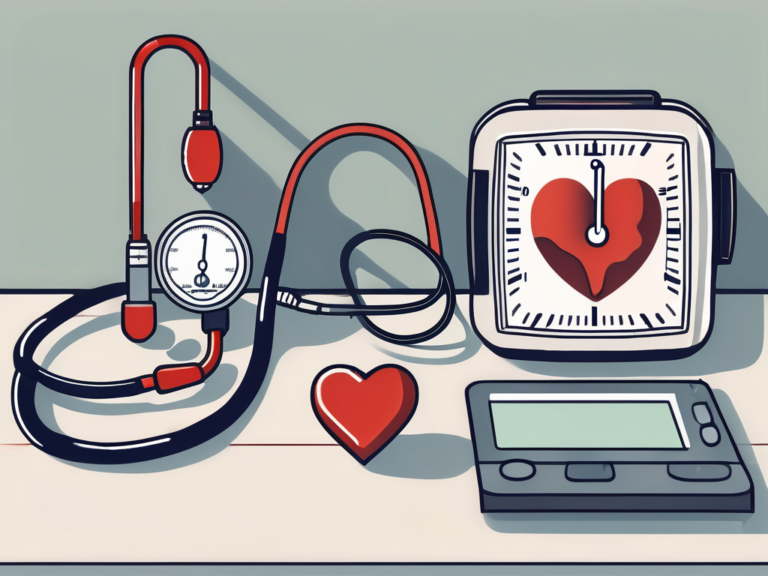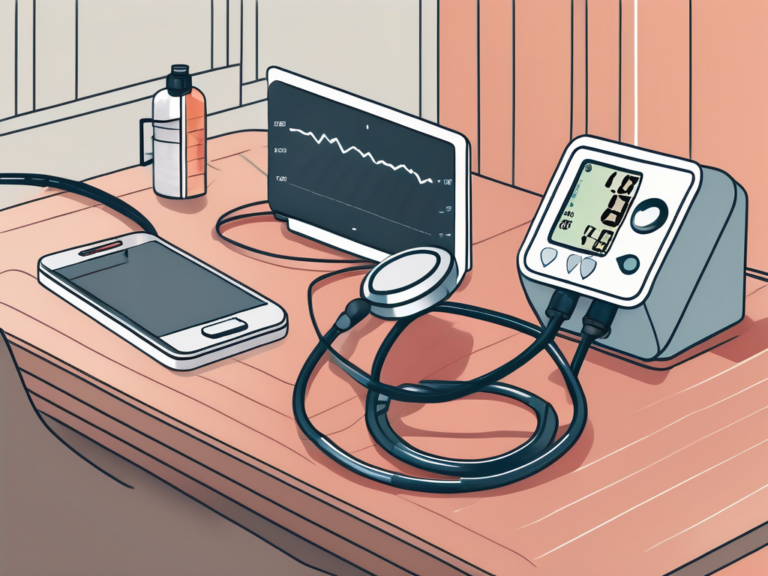How Can I Rule Out a Heart Attack at Home?
In our fast-paced world, it’s easy to get caught up in the chaos of everyday life. We often neglect our health, ignoring the subtle warning signs that our bodies may be sending us. One such warning sign is a heart attack – a condition that affects millions of people worldwide. The thought of a heart attack can be terrifying, but what if there was a way to rule it out from the comfort of your own home? In this article, we will explore the basics of heart attacks, self-evaluation techniques, the importance of medical consultation, and prevention through healthy living. So let’s dive in and empower ourselves with the knowledge to take charge of our heart health!
Understanding the Basics of Heart Attacks
The first step in ruling out a heart attack at home is understanding what it is. A heart attack occurs when the flow of blood to the heart is blocked, usually by a blood clot. This blockage prevents oxygen from reaching the heart muscle, which can lead to serious damage. It’s crucial to recognize the common symptoms of a heart attack, as early intervention greatly increases the chances of survival and recovery.
What is a Heart Attack?
A heart attack, also known as myocardial infarction, is a medical emergency that requires immediate attention. It occurs when the blood supply to the heart muscle is severely reduced or completely blocked, depriving it of oxygen and nutrients. This lack of oxygen can cause the heart muscle to become damaged or even die, leading to serious complications.
When a heart attack occurs, the affected area of the heart may not receive enough blood flow, leading to a condition called ischemia. Ischemia can cause chest pain or discomfort, known as angina, which is a warning sign that the heart muscle is not receiving enough oxygen. If the blood flow to the heart is not restored promptly, the affected area of the heart muscle can undergo irreversible damage.
Common Symptoms of a Heart Attack
Recognizing the symptoms of a heart attack is crucial for early intervention. These symptoms can vary from person to person, but common signs include chest pain or discomfort, shortness of breath, nausea, lightheadedness, and sweating. It’s important to note that some people may experience atypical symptoms, such as jaw pain, back pain, or fatigue. If you experience any of these symptoms, it’s essential to act quickly and seek medical attention.
In addition to the physical symptoms, it’s important to be aware of the emotional and psychological impact a heart attack can have. The fear and anxiety associated with experiencing a heart attack can be overwhelming, and it’s essential to seek support from loved ones and healthcare professionals to navigate the emotional aftermath. Understanding the psychological aspects of a heart attack can help individuals and their families cope with the long-term effects and make informed decisions about lifestyle changes and cardiac rehabilitation.
Furthermore, it’s worth noting that certain risk factors can increase the likelihood of experiencing a heart attack. These risk factors include age, family history of heart disease, high blood pressure, high cholesterol levels, smoking, obesity, diabetes, and a sedentary lifestyle. By addressing these risk factors and making necessary lifestyle changes, individuals can significantly reduce their chances of having a heart attack.
Self-Evaluation Techniques
When it comes to assessing your health, it’s always better to be safe than sorry. While it’s not possible to definitively rule out a heart attack at home, there are self-evaluation techniques that can help you gain a better understanding of your symptoms and decide whether immediate medical attention is necessary.
Recognizing the symptoms of a heart attack is crucial in determining the appropriate course of action. One of the key signs to watch out for is chest discomfort or pain. But how do you differentiate between a heart attack and other possible causes? Well, let’s delve into it.
Recognizing Heart Attack Symptoms
When evaluating your symptoms, pay close attention to the nature of the chest pain. Is it a sharp, stabbing sensation, or does it feel more like pressure or tightness? Does the pain radiate to your arms, jaw, neck, back, or stomach? These are important details that can provide valuable insights into the nature of your condition.
But that’s not all. Take note of any accompanying symptoms such as shortness of breath, dizziness, or cold sweats. These additional signs, when combined with chest discomfort, could be strong indicators of a heart attack. It’s important to be aware of your body and listen to what it’s trying to tell you.
The Role of Pain and Discomfort
Now, it’s crucial to understand that not all chest pain is a sign of a heart attack. Muscle strain, indigestion, or even anxiety can also cause similar symptoms. However, if you find yourself unsure or if the pain is severe and persistent, it’s always better to err on the side of caution and seek medical advice. Remember, it’s better to be safe than sorry.
By being proactive and aware of your symptoms, you are taking an important step towards safeguarding your health. Self-evaluation techniques can provide valuable insights, but they should never replace professional medical advice. If you have any doubts or concerns, don’t hesitate to reach out to a healthcare professional who can guide you in making the best decisions for your well-being.
Importance of Medical Consultation
While self-evaluation techniques can provide some guidance, it’s crucial to recognize the limitations and dangers of self-diagnosis. Consulting with a healthcare professional is always the best course of action when it comes to ruling out a heart attack.
When to Seek Immediate Medical Attention
If you experience chest pain or discomfort, especially if it radiates to your arms, jaw, neck, or back, it’s essential to seek immediate medical attention. Don’t wait and hope that it will go away on its own. Trust your instincts, and remember, it’s better to be safe than sorry when it comes to matters of the heart.
The Dangers of Self-Diagnosis
Self-diagnosis can be tempting, especially with the wealth of information available on the internet. However, relying solely on online sources or personal opinions can be dangerous. Only a qualified healthcare professional can accurately assess your symptoms and provide appropriate guidance.
When it comes to matters of the heart, seeking medical consultation is not only important but also potentially life-saving. Heart-related conditions can be complex and require a thorough evaluation by a healthcare professional. While self-evaluation techniques can provide some initial guidance, they cannot replace the expertise and knowledge of a qualified medical practitioner.
During a medical consultation, a healthcare professional will take into account various factors, such as your medical history, family history, lifestyle, and current symptoms, to make an accurate assessment. They may perform a physical examination, order diagnostic tests, or refer you to a specialist if necessary. This comprehensive approach ensures that all potential underlying causes are considered and addressed appropriately.
Furthermore, seeking medical consultation offers the opportunity for personalized advice and guidance. A healthcare professional can provide you with tailored recommendations based on your specific circumstances. They can educate you about risk factors, preventive measures, and lifestyle modifications that can help improve your heart health. This personalized approach is invaluable in managing and preventing heart-related conditions.
Prevention and Healthy Living
While ruling out a heart attack is crucial, prevention is even more important. By adopting a heart-healthy lifestyle, you can significantly reduce your risk of heart disease and improve your overall well-being.
But what exactly does a heart-healthy lifestyle entail? It’s all about making small changes in your daily routine that can have a big impact on your heart health. One of the key factors is regular exercise. Incorporating activities like brisk walking or cycling into your schedule can help strengthen your heart and improve blood flow throughout your body.
Avoiding tobacco and limiting your alcohol consumption are also crucial steps towards maintaining a healthy heart. Tobacco use is a major risk factor for heart disease, as it damages your blood vessels and increases the likelihood of blood clots. Similarly, excessive alcohol consumption can lead to high blood pressure and an increased risk of heart disease.
Another important aspect of a heart-healthy lifestyle is choosing nutritious foods. Filling your plate with a variety of fruits, vegetables, whole grains, and lean proteins can provide your body with the essential nutrients it needs to function optimally. On the other hand, it’s important to reduce your intake of saturated and trans fats, as these can raise your cholesterol levels and increase your risk of heart disease.
Managing stress is also crucial for maintaining a healthy heart. Chronic stress can contribute to high blood pressure and inflammation, both of which are risk factors for heart disease. Incorporating relaxation techniques like meditation or yoga into your daily routine can help reduce stress levels and promote overall well-being.
Lastly, don’t forget the importance of regular check-ups with your healthcare provider. They can monitor your blood pressure, cholesterol levels, and other vital markers of heart health. By catching any potential issues early on, you can take proactive steps to improve your heart health and reduce the risk of a heart attack.
So, remember, prevention is key when it comes to heart health. By making these lifestyle changes and staying proactive about your well-being, you can pave the way for a healthier heart and a happier life.
Conclusion: Balancing Awareness and Medical Advice
Ruling out a heart attack at home is not possible, but by understanding the basics of heart attacks, using self-evaluation techniques, and seeking medical consultation when necessary, we can take control of our heart health. Prevention through lifestyle changes and regular medical check-ups is key to maintaining a healthy heart. While it’s important to be aware of the signs and symptoms of a heart attack, always trust the guidance of healthcare professionals for accurate diagnosis and treatment. Together, let’s prioritize our heart health and live life to the fullest!






